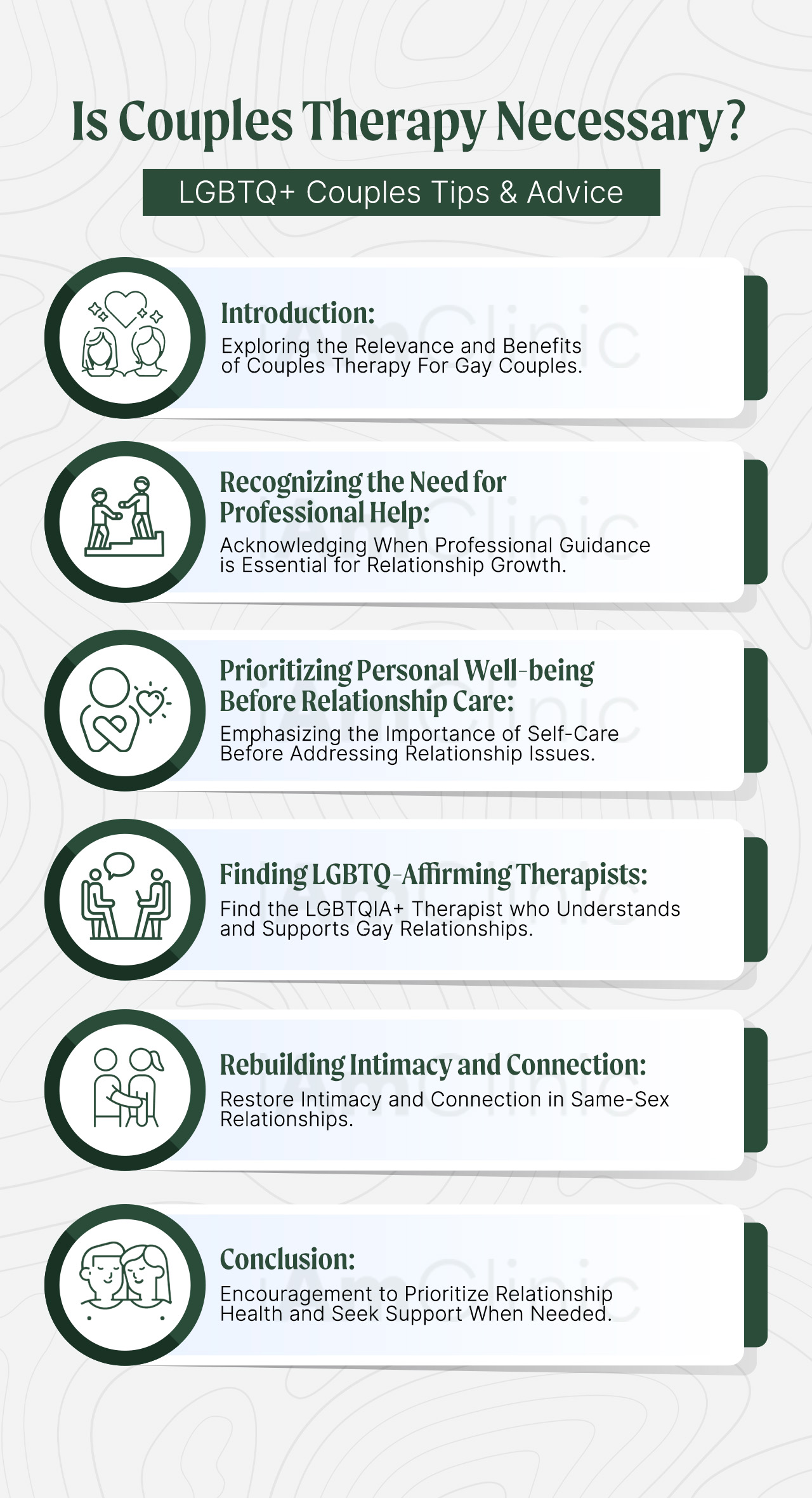Table Of Contents
Realizing I Needed Professional Help
After ensuring I could take care of myself
Finding the Right LGBTQ-Affirming Therapist
Rebuilding Intimacy as a Queer Couple
My Partner Says, “We Need Therapy”, But What Does Gay Couples Therapy Cost?
For the first 15 years of my dating life, playing the role of a committed partner always led me to feel obligated and controlled. Frustrated, I couldn’t understand why I was losing myself, my dreams and my individuality. Dating was a vacuum that seemed to suck out everything that made me, me.
I always felt like my partners were nagging at me to do things another way or to become someone else. In this context, I would never be enough to keep the man-of-the-moment happy.
Back in 2005 when I started dating, I thought couples therapy was for married folks. It wasn’t for boyfriends who were dating with serious intentions.
As I pushed toward my 30th birthday, however, I realized that I was also pushing men away from me—really good men! Fear of growing old was rattling my internal cage, but not nearly as much as the fear of being a crappy partner who might die alone.
I finally realized that I needed professional help.
When I took my first steps into a couples and relationship’s counseling office, I was a wreck. My relational home was a mess!
Over time, I began simplifying my habits, organizing my identity, and reassembling my gifts. Right away, I implemented boundary setting and healthy expectations. I grew in confidence that I was a healthy person. Although I had done major work to know who I was, I hadn’t yet plunged into the depths of who I was in relationships.
After ensuring I could take care of myself, it was time for me to take care of my relationship.
Before couple’s therapy I assumed that to be in a relationship meant keeping my partner pleased. I would compromise my desires, stuff my dreams and shut down my opinion. And when I wasn’t busy camouflaging my personality, I was trying to be spectacular. I figured a fancy car, a shiny career and expensive clothes would keep my man proud of me. I wanted to be the mysterious arm candy that everyone wanted to taste.
Needless to say, couples counseling helped me see just how much I had turned relational intimacy into a performance.
In our therapist’s office, my boyfriend and I sat eager and nervous. There, I learned to acknowledge that the behaviors I had called controlling were actually my partner’s requests—that I grow in maturity, communicate effectively and offer my uninhibited opinion. I began to shed the layers that kept me protected from changing and those that kept me from seeing the liberating truth of relational intimacy.
I noticed something for the first time on my therapist’s couch; now as a couple’s counselor, I see it in many of my clients: many of us in the LGBTQIA+ community fear that the perfect person could be just around the corner, even while we’re madly in love with someone else. We have trained ourselves to imagine that another person—with a better smile, a more tender heart, a vibrant personality or a perfect body—is out there waiting for us. Ultimately, we fear commitment because we might lose an opportunity to find this imaginary ideal, someone better who never quite materializes.
Bottom Line
All relationships are messy, hard and challenging. We will never find a partner(s) with a perfect personality or a spotless track record. We are all perfectly imperfect.

In spite of our imperfections, I believe we grow most in a relationship, especially intimate ones, because our full selves are on display. Relationships provoke our deepest yearnings, our biggest insecurities, our long-standing resentments and our biggest dreams. Relationships are the arenas where we sharpen our skills sets, build our stamina, and eventually become masterful gladiators. Our relational prowess may be on display to an entire arena of friends and family spectators, but our partners occupy the front row seats. You didn’t think you were fighting your partner, did you? In the relationship arena, we face ourselves.
My partner has heard me voice my internal narratives of shame, inadequacy and self-doubt. As I grew to repair these voices, he grew so that he could affirm me, not just with his words, but his actions. To know that my partner has watched me wage the most deeply rooted internal battles AND then has intentionally grown in his own right—so that I might feel utterly safe, completely accepted, and unconditionally loved by him—that makes him irreplaceable!
I hope I have done the same for him.
For us, couples counseling wasn’t just about working through arguments and learning to communicate. It was about growing in emotional and relational stability so that together we could create the relational home that allows us to live in full authenticity and belonging side-by-side. Now, several years later, our time in couple’s therapy has proven to be worth every ounce of energy.
If you need help with your relationships or being a healthy partner, it’s never too late to get help, and it’s never too early to start building a relational home. Trust me!
Finding the Right LGBTQ-Affirming Therapist
Searching for an LGBTQ-friendly therapist who understands the unique needs of queer relationships can feel daunting. Here are some tips: Learn more about the Pros and cons of using insurance for therapy!
- Check therapist directories like Psychology Today that allow filtering by issues like “LGBTQ” or “same sex relationships”.
- Look for statements on their website or bios mentioning LGBTQ counseling certification, training, or experience. You can ask about their credentials.
- Inquire about their specific experience counseling queer couples. How many have they worked with? For what issues?
- Ask if they will provide an LGBTQ-affirming environment and not make assumptions about your sexuality or relationship.
Investing in your relationship/marriage through LGBTQIA+ couples therapy can provide essential support for both partners.
Rebuilding Intimacy as a Queer Couple

Intimacy issues can arise in any relationship. As a same-sex couple, you also navigate extra challenges that can impact your connection. Here are some tips to restore closeness:
- Make time for quality conversations without distractions or devices. Be present.
- Maintain physical touch, even when struggling. Hug, cuddle, hold hands.
- Compliment your partner’s non-physical attributes like kindness, humor, determination.
- Occasionally reminisce about your first dates, when you fell in love.
- Prioritize emotional intimacy first. Sexual issues often reflect deeper problems.
Frequently Asked Questions
How can therapy help my relationship?
Therapy provides a safe space to improve communication, increase intimacy, manage conflict, understand each other’s needs, and gain healthy relationship skills. It can help you reconnect and strengthen your bond.
What issues do gay couples commonly address in therapy?
Common concerns include communication problems, intimacy issues, conflicts over finances or family, infidelity, challenges with coming out, navigating differences, handling external stigma, and personal growth as a couple.
What should I look for in a gay-affirming couples therapist?
Look for a licensed therapist experienced working with LGBTQ couples. Ensure they create a welcoming, non-judgemental environment. Ask about their specific training and competency with gay couples.
How long does couples therapy take?
The length depends on your challenges. Brief therapy may resolve simpler issues in a few months. Ongoing therapy over months or years may help for ingrained patterns or deeper challenges.
How often should couples therapy sessions occur?
Typically once weekly is best for making progress. Consistency helps build on each session. For crisis issues, 2-3 times per week may help stabilize the relationship.
Are you ready to create a healthy relational home? We’re here to help.


